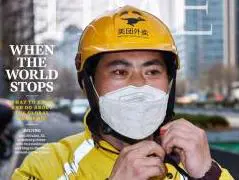Photo shows the cover of Time magazine with Gao Zhixiao as cover person. (Photo Credit: Time magazine)
by Xinhua writers He Chenyang, Xie Jianwen and Cao Bin
Gao Zhixiao, 32, might have been the first delivery driver to become an Internet celebrity, have an entry of his own on China's biggest search engine Baidu, and even make the cover of Time magazine.
Gao was born in an impoverished mountainous village in Xihaigu, once regarded as uninhabitable for humans due to frequent drought and poor soil, in northwest China's Ningxia Hui Autonomous Region.
Unlike his father and grandfather, Gao did not want to live at the mercy of the elements and left for Beijing after graduating from middle school.
During his early years as a migrant worker in Beijing, he had to take on part-time jobs in the evenings to support his ill brother at home. After trying his hand as a dishwasher, assistant cook, security guard and many other temporary positions, he started working as a deliveryman with China's food reviews and delivery giant Meituan Dianping in 2012.
In late January of this year, the outbreak of COVID-19 shut almost all public places down. Stay-at-home citizens began to realize how indispensable online ordering and delivery services are to their daily lives.
Facing soaring orders brought by the epidemic, Gao canceled his train ticket home for the Lunar new year and went to work.
"I didn't know how to help with the virus fight, but I knew I was needed when people couldn't go out for daily necessities," Gao said.
Online shopping and delivery have overnight become critical services for citizens across China. According to a Meituan report, non-meal orders for items such as vegetables and medicines have increased by 77 percent during the epidemic.
"I always take my first order at about 8 a.m., and I won't call it a day until achieving the goal of 50 orders," Gao said. "I want to earn more and serve more. I don't care if it's midnight when I finally return home."
Late this February, Gao received a special order from a client in need of insulin. Gao had to fetch the prescription at the client's home first before going to a designated hospital to pick up the drug and returning once again.
The client, in her 70s, was living alone. Gao stayed for a while chatting with her, even offering to make a bowl of noodles before leaving. He spent nearly 40 minutes on this single order.
"I could have completed more orders with the 40 minutes, and honestly it was rather risky to go to a hospital back then. But other riders would have done the same if they received the order," said Gao.
Gao travels more than 100 km every day and meets different clients. To ensure the safety of both clients and staff, Meituan has intensified disinfection measures including contactless distribution, and purchased health insurance for all its riders.
"I'm not that worried about infection, because I carry out frequent and thorough disinfection every day," Gao said. "And people around me keep giving me hope that we will overcome the difficulty together very soon."
Two weeks ago, a client ordered takeaway food as a thank-you gift to three security guards for their hard work during the epidemic. Gao was impressed by the astonishment on their faces.
"They reminded me of my first time receiving masks and tips from a customer," Gao said. "Heartwarming moments like this were many."
On its March 19 edition, Time magazine published six covers for its special coronavirus issue under the theme "When the world stops" -- ranging from the balconies of Tehran to the streets of China -- to show how people's lives changed amid the outbreak. Gao's heavy features and square face were thus known to the world.
China's response to COVID-19 created a "quarantine economy," and millions are relying on delivery services, said the magazine, citing that if not for riders like Gao, many families would face risks of infection themselves while shopping or buying food and patients would not receive timely medical care.
In February, the Chinese government added delivery riders to its national occupation list, which should lead to improved working conditions and more career opportunities for the group.
Gao is not fighting alone. Data from Meituan shows that newly registered delivery riders topped 400,000 over the past two months. They ride on the streets as the "pulse" of cities, like red blood cells carrying oxygen of life.
"I'm an ordinary person, and I just do what I should," Gao said. "In this anti-epidemic campaign, I think we deliver more hope than mere sacks of rice or flour."
 简体中文
简体中文

